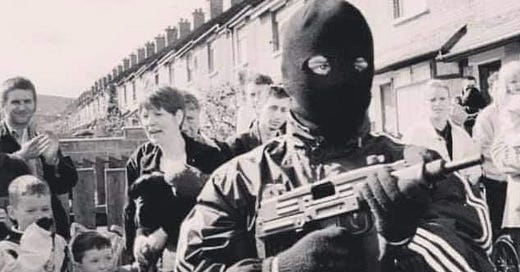Betrayal: The Irish Curse
Betrayal! Feall!! The word hangs in the air like a curse, heavy with the weight of centuries, millennia. In Ireland, to the Irish, it’s not just a sin; it’s a death sentence for the soul, a stain that never washes out. Loyalty isn’t a choice —it’s survival, carved into the bones of a people who’ve bled through invasions, famines, and oppression. The myths and the history, they’re not just stories; they’re the marrow of Irish identity, and they scream one truth: betray, and you’re not only damned, your beating heart will be ripped from your fuk'n chest!
The Mythic Gut-Punch
Look back to the old tales, the ones that shaped the Irish mind. Bres, that half-Fomorian bastard, thought he could play both sides, ally with the enemy, and what did he get? Chaos. The universe itself recoiled, and the Tuatha Dé Danann cast him out like a disease. Or Conor MacNessa, the king who swore protection to Naoise and then gutted him like a pig. That’s not just betrayal; that’s spitting on the sacred—féile, the hospitality that binds men more closely than even blood. The myths don’t forgive; they curse. Aoife, jealous bitch, turned her stepkids into swans for 900 years, and what did the gods do? Turned her into a demon, shrieking in the wind forever. That’s the Irish way: betray, and the gods themselves will hunt you down!
History’s Open Wounds
Then there’s history, the real knife in the gut. MacMurrough, that sniveling king of Leinster, invited the Normans in, sold his soul for a crown, and what did he buy? Eight hundred years of chains for his people. His name’s a curse now, spat out like poison. And the informers—McNally, Balfe, Donaldson—rats gnawing at the heart of rebellion. They didn’t just betray friends; they betrayed the struggle, the dream of freedom, they betrayed their own for comforts. Donaldson got what was coming, a bullet in the dark, the IRA’s long memory settling the score. How many snitches and betrayers were killed in the long fight for independence, in all the centuries before? In the dark, in their beds, many thousands across time, the earth salted with their blood. To the Irish, betrayal is never forgiven; it’s a death warrant! No matter how long it takes. No one revenges like the Irish against their own who've betrayed.
Why It Cuts So Deep
Féile—The Sacred Trust You Don’t Fuck With
Feall’s a blade through féile, the generosity and hospitality that’s more than manners—it’s a pact. Conor MacNessa didn’t just kill Naoise; he shredded a sacred bond. Same with informers like McNally, worming into rebel trust only to sell it out. That’s not just dishonor; it’s sacrilege.
Survival on the Line
This isn’t a culture of soft hands. Invasion, famine, oppression—traitors didn’t just hurt feelings; they killed communities. MacMurrough’s deal handed Ireland to foreigners for centuries. Balfe and Donaldson snitched, and bodies piled up. Betrayal’s a threat to everything that keeps the Irish alive and strong.
Justice, Divine and Dirty
The myths promise hell—Aoife’s demonic fate—and history delivers it raw. Donaldson’s execution wasn’t just revenge; it was a reckoning, a nod to ancient codes. Betray, and you’re answering to something bigger than man.
The Gray Shit
This isn't to say it’s not always so clean-cut and obvious. Take Michael Collins, signing that treaty. Half the country howled traitor, the other half saw a man playing the long game. Loyalty or pragmatism? The fight’s still alive in pub arguments. And those Gaelic chiefs kissing Elizabeth I’s ring—traitors or desperate survivors? History damns them, but the truth’s a swamp. Regardless, don't matter; the stain sticks.
Informers: The Bottom of the Barrel
Informers, though—they’re the lowest. McNally, Balfe, Donaldson—they turned from inside, like rot in the bones. Cowardice, lies, and licking the oppressor’s boots—that’s the Irish hell trifecta. No mercy, no redemption, just infamy, and a bullet to the head, a rope and a lamp post, a knife in the ribs in the cigarette smoke of the pub.
Collaborators: The Vilest of Filth
In the dark days of the Tan War and the Civil War, men like O’Connor, Murphy, and Kelly donned the oppressor’s garb, wielded the oppressor’s whip, and betrayed their own. They strutted in foreigner’s colors, enforced foreigner’s laws, and crushed the spirit of their kin with a boot to the throat. Cowards and curs, collaborators hide behind badges and titles. They sell their souls for a pittance, their loyalty bought with coin and comfort, while the people starve and bleed. Their hands are stained with the blood of their brothers, their faces twisted with the sneer of the turncoat. They're a cancer, a blight upon the land, and like all cancers, they must be cut out. No forgiveness, no redemption—only the cold justice of a personal face-to-face death. To the Irish, they're less than men—vermin marked for the grave, their infamy a stain time won’t ever wash clean.
The Final Warning
Here’s the truth, raw and real: in Ireland, to the Irish worldwide, betrayal’s not just wrong; it’s annihilation. It’s a rupture in the cosmic order, a wound in the cultural soul. Traitors don’t just die; they’re eradicated, their names cursed, their fates and rotting corpses a message. Loyalty’s non-negotiable. Betrayal’s the ultimate desecration. The Irish spirit and people doesn’t and don't forget, and they sure as hell don't ever forgive!





The Irish rebel is but a distant memory. Our current and last crop of politicians have sold us to the EU. They are the true traitors.
Irish have a myth: they will die fighting.
Canadians have rules: they will die voting.